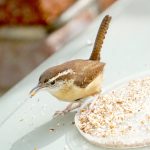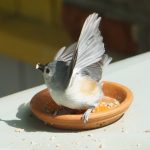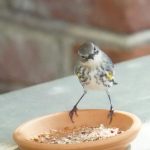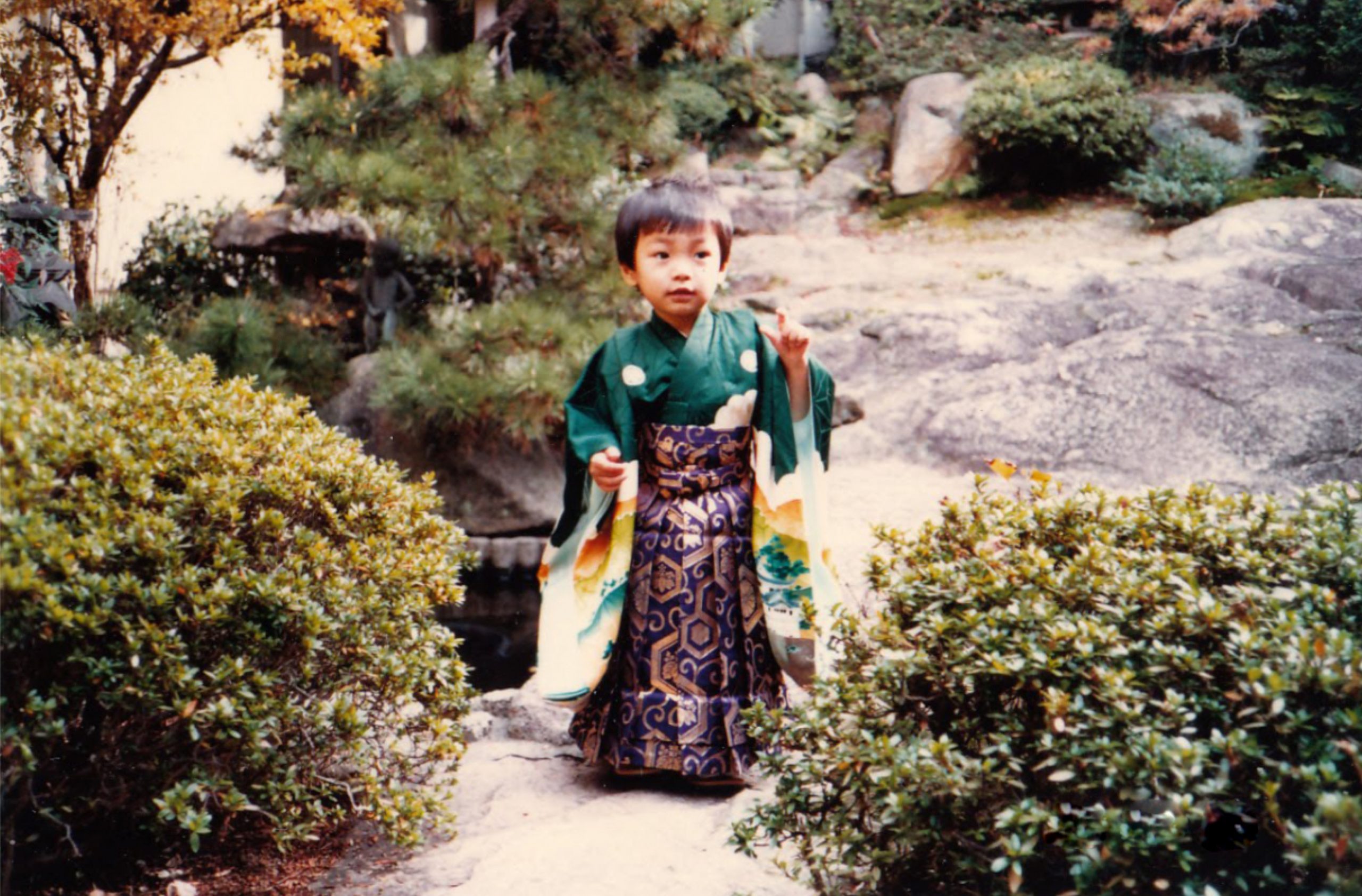和訳は英文の下にございます。/ The Japanese translation is below the English text.
Caution!
Table of contents 1. Pecans for wild birds 2. Opened window 3. Yellow-Rumped Warbler 4. Caution 5. A person of caution
1. Pecans for wild birds
This spring, I offered pecans to wild birds in our backyard. Before long, Carolina Wren, Tufted Titmouse and Yellow-Rumped Warbler found it likeable and visited the dish frequently.
I put the dish on the HVAC unit outside my window, so I could observe and see the different eating habit of each bird.
The wren liked larger chopped pecans and usually swallowed a piece on the spot.
The titmouse preferred even larger pieces. They triumphantly brought a big piece to a branch of the orange tree standing nearby, and held it between their legs while breaking it into the desired size.
The warbler stayed on the dish and picked tiny pieces one at a time, chopped to the size of coarse salt. It came to the dish many times a day.
2. Opened Window
When my window was closed, the birds didn’t notice that I was watching. They ate and stayed freely, and didn’t pay attention to my direction.
One day, I opened the window half-way to see them better.
They could now easily see into my room all the way.
They stopped coming.
Actually, they came down to the HVAC machine, but flew away when they noticed I was there.
However, they didn’t repeat this too many times before they found a way. First, the titmouse began to quickly pick a big piece and flew off to the orange tree.
Then, the wren also quickly grabbed a piece and hopped off the HVAC machine. (It likes to hop down.)
These didn’t happen with the poor warbler.
3. Yellow-Rumped Warbler
The warbler froze when it saw me in the back of the room.
It kept watching this way, beyond the pecans, and swayed for a long time between caution and interest in the nuts. Finally, prudence overcame and it flew away.
Still the pecans were attractive, it came to the HVAC machine again. The human was still around, so it hesitated and wondered:
“Maybe it’s OK. Shall I take a chance? Shall I try?”
At times it nudged toward us a couple of centimeters (one inch or so), but it couldn’t make up its mind and ended up flying away.
The wrens and titmice had gratified me by returning without much reservation. I wanted the warbler to feel better about me, too. I kept the window open but it hesitated every time.
Finally, I reluctantly admitted to myself that I was the cause of its stress, and closed the window. After that, it came to the nuts as freely as the other birds.
On a day in April, none of the Yellow-Rumped Warblers showed up. The are migratory and they leave for the North at the end of spring.
4. Caution
I don’t think the warblers are cowards just because they don’t act as boldly as wrens and titmice. They are only cautious and prudent.
Caution and prudence are also important in pursuing martial arts.
One may think martial arts let people be more proficient in the use of weapons and/or more skillful in damaging or killing an opponent, but they are not everything.
Some experts in traditional Japanese martial arts consider the ultimate secret of martial arts is rather an ability to create a situation in which they don’t have to engage.
5. A cautious person
By the end of Edo Era, traditional Japanese martial arts became obsolete as interest in the modern arms of the West increased. However, when Satsuma Rebellion (1877) broke out, traditional swordsmen on both sides showed formidable lethal potency. After that, the Great Japanese Imperial Navy and Army encouraged their members to learn traditional martial arts.
There is an episode of those days about a navy officer called Togo Heihachiro.
One day, Togo saw a packhorse in the direction he was walking. He crossed the street and passed it on the other side.
When his colleague reproached him for avoiding a packhorse like a coward, he answered, “If the horse had become unruly and hurt me, I wouldn’t have been able to perform my duties. It is also my job to avoid that kind of a situation.”
Years later, when the Minister of the Navy recommended Togo to the Emperor as the first commander of the combined fleet of the Imperial Japanese Navy, the minister commented, “Togo is a man with strong luck.”
Togo did have good luck and destroyed the Russian Baltic Fleet in the Battle of Tsushima (1905).
Some say his watchful prudence such as he showed with the packhorse must have contributed to it and this episode is well remembered.
[End of the English text]
用心第一
目次
1. 野鳥にぺカンナッツ
2. 窓を開けると
3. キヅタアメリカムシクイの場合
4. 用心深さ
5. 用心深い人
1.野鳥にぺカンナッツ
この春、ぺカンナッツを刻んで窓の外に出したら、チャバラマユミソサザイ、エボシガラ、キヅタアメリカムシクイが代わる代わる来るようになりました。
ぺカンのお皿を窓の前のエアコン機の上に置いたので、それぞれの鳥の好みがわかってきました。
ミソサザイは粗みじんが好きで、よくその場で飲み込みます。
エボシガラは粗みじんやもっと大きいのが好きで、近くの木の枝へ持っていっては足の間で押さえ、くちばしで割って食べます。
アメリカムシクイはその場で食べます。大きな粒は苦手で、粗塩ぐらいの粒に小さく刻んだものを、日に何度もやってきて食べます。
2.窓を開けると
窓が閉まっていると、鳥たちはこちらに気づかず、安心して食べたりとどまったりします。
ある日、鳥たちををもっとよく見たいと思い、窓を半分ぐらい開けてみました。
しかし、ガラスがないと、小鳥の鋭い目は部屋の奥までかんたんに見通し、食べに来なくなりました。
食べようとしてエアコン機まで来るのに、私に気づくとお皿に近づかず、飛び去ります。
それでも、何度かこれを繰り返すうち、最初に、エボシガラがさっと大粒のナッツを選び取り、木の枝に飛び去るようになりました。
それから、ミソサザイも、素早くつかんですとんと地面に飛び降りるようになりました(ミソサザイは飛び降りるのが得意です)。
気の毒なのはアメリカムシクイでした。
3.キヅタアメリカムシクイの場合
キヅタアメリカムシクイは、部屋の奥の私に気づくと、固まってしまいます。
こちらを見つめたまま、人間への警戒と、ナッツを食べたい気持ちの間で長い間揺れた挙句、警戒心が勝って、あきらめて飛び去ります。
ぺカンナッツは好物なので、またやってきます。すると、まだ人間がいるので、考えます。
「大丈夫かもしれない。やってみるかな、行こうかな」
数センチにじり寄ってくることもあります、が、結局は決心がつかず、飛び去るのです。
エボシガラやミソサザイは平気で戻ってくるようになったので、私はうれしくて、アメリカムシクイにも慣れてほしいと思いました。しばらく窓を開け放しておきましたが、状況は一向に変わりません。
自分が「羽のある友人」のストレスになっていることにようやく気付いて、私は窓を閉じました。それからは、アメリカムシクイは安心してぺカンナッツを食べにくるようになりました。
そして4月のある日、キヅタアメリカムシクイは仲間と共に一斉に姿を見せなくなりました。渡り鳥で、春の終わりには北へ帰っていったのです。
4.用心深さ
キヅタアメリカムシクイがミソサザイやエボシガラのように大胆に行動しないからといって、臆病だとは思いません。用心深いだけです。
用心深さは、武道においても大切なことです。
武道の目的は、武器の使い方や相手を殺傷する能力の育成と考えがちですが、それだけではない。むしろ、戦わなくて済む状況を作れることこそ極意である、という考え方も日本の伝統武芸の達人の間にはあります。
5.用心深い人
江戸末期に、西洋の近代的な軍事力への興味が高まり、日本の武道は廃れました。しかし、明治時代になって西南戦争 (1877) が起こった時、伝統武芸を身に着けた兵員の殺傷能力が非常に高いことが示されて、見直され、帝国海軍では伝統的な武道が奨励されたといいます。
この頃、海軍の東郷平八郎という人の話があります。ある時前方に荷馬がいたので、東郷は道を渡って反対側を歩きました。
同輩が「武人が馬をおそれて (臆病者のように) 道を避けるとは」となじると、東郷は平然として「万一馬が暴れて怪我でもして、本務に障りが出れば、それこそ武人の本務にもとります」と答えました。
のちに海軍大臣が東郷を連合艦隊司令長官に推奨した際、「あれは運のよい男ですから」と奏上したそうです。
東郷は確かに運がよくて、日露戦争でバルチック艦隊を破りました (1905年)。東郷の強運には、荷馬を見てちょっと癇が高ぶってるなと思ったら素早く道を変えるような用心深さも大いに与していたのだという人もおり、この話はよく知られています。
[和文部終わり]







Greetings!
I would like to thank everyone who liked this article, who encouraged me, and who advised me on this blog.
I am reading each one of your messages. I can’t reply to you all, but I really appreciate it.
If you would like a direct response from me, kindly try using [email protected].
Best wishes, Yuko